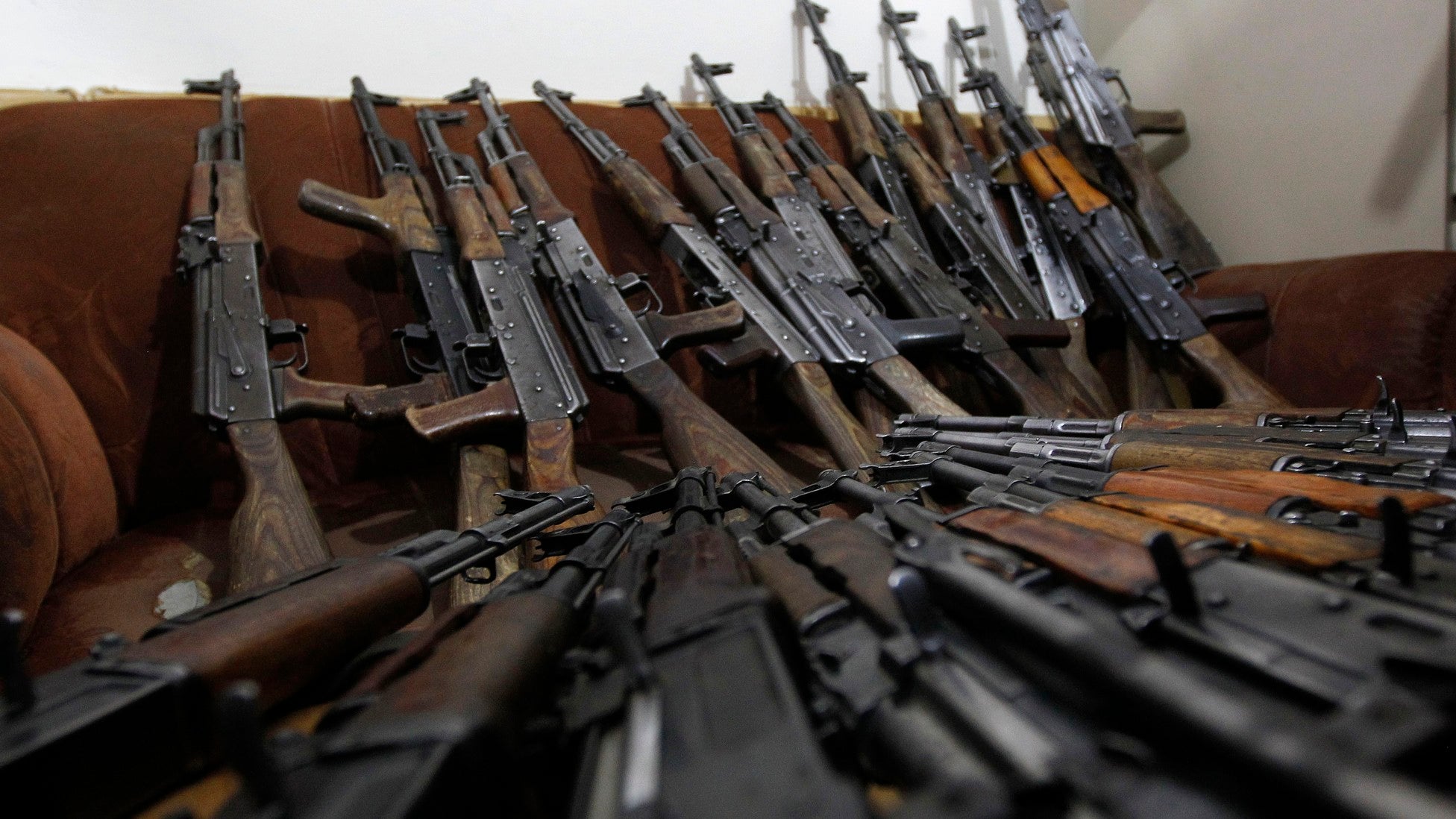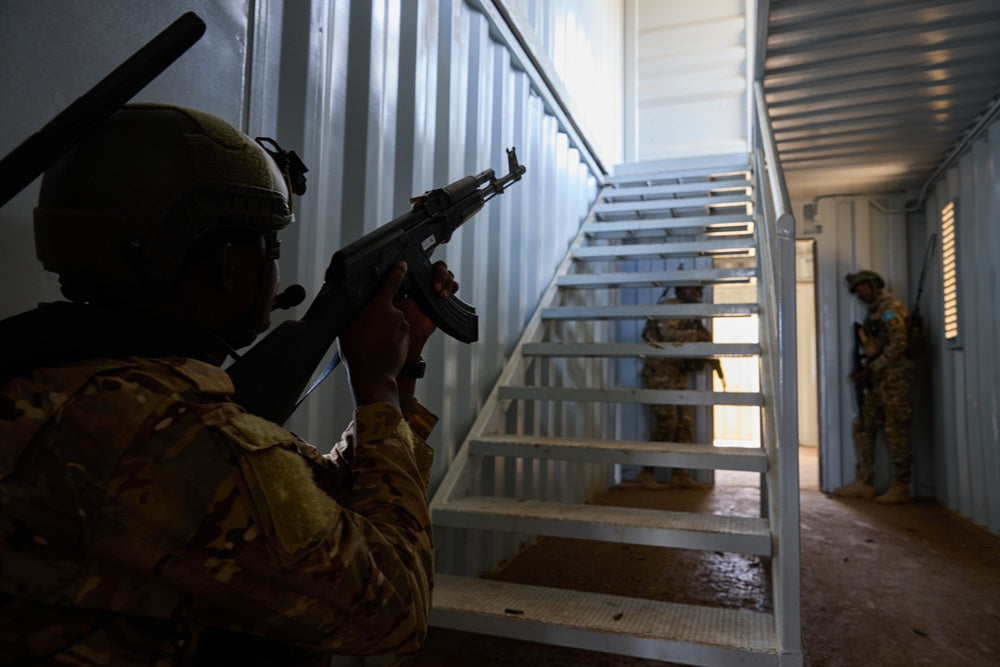
Syrian Mercenaries in Africa
Reuters photo by Omar Sobhani
BY GABRIEL FANELLI
Cause and coin, the raisons d’être for those in the warrior profession. In the absence of a cause, fighting men (and women) will find avenues to utilize their hard-learned skills in order to pay the bills and take care of their family. Nowhere is this more apparent than in West Africa, where Turkey has sought to protect its growing commercial interests in the region with the help of former soldiers from the Syrian National Army. Given the average monthly salary in Syria tops out at $14.00, the $1,500 monthly compensation offered by SADAT International Defense Consultancy has former opposition fighters lining up like an Army recruitment center on December 8, 1941. Cause and coin.
The fallout from the Syrian Civil War continues to shape regional and global affairs. From the rise – and fall – of the Islamic State, to the formation of the Kurdish autonomous region of Rojava, the conflict has thrown conventional regional politics out the window, as well as claimed just over 600,000 lives according to the Syrian Observatory for Human Rights. At outset of the war in 2011, an opposition coalition formed under the banner of the Free Syrian Army (FSA). They have since rebranded themselves as the Syrian National Army (SNA). Headquartered in Aleppo, the SNA ballooned to a 100,000-man fighting force which is almost entirely supported by Turkey. Various themes in the SNA ideology include anti-Assadism, Anti-Kurdism, and Neo-Ottomanism. As of today, their list of international allies includes Turkey, Qatar, Azerbaijan, and Niger. Those SNA soldiers who signed contracts under SADAT did so at the headquarters of the Sultan Murad Division – a Turkmen unit within the opposition coalition controlled by Ankara.
Over the last decade, Turkey saw an opportunity to capitalize on the fractious relations the international community had with failed or near failed states such as Somalia and offered a financial hand when no one else would. Now, Turkey seeks to extend its commercial, political and defense influence across the entire Sahel, a 600-mile-wide band of arid desert that spans from Mauritania and Senegal in the West to Somalia and Djibouti nearly 4,000 miles east. Along the way it has, just like the Russians and Chinese, handed out a number of loans and opportunities to African nations, without the moral conditions placed on them by the United States.
Several nations in the Sahel are throwing off the last vestiges of their colonial pasts, kicking out French and U.S. troops and even leaving the regional organizations they were once apart of, like the Economic Community of West African States (ECOWAS) as Mali, Burkina Faso and Niger did earlier this year. The Nigerien government in Niamey refers to Russia, China and Turkey as allies that respect its sovereignty. The United States is slated to pull out all of its troops by September 2024.
Syrian nonprofit Enab Baladi (Grapes of my Country in English) reported on the path from Aleppo to Niamey during an interview with an anonymous source. Fighters are added to a WhatsApp group with dozens of others to streamline the recruitment process. They are to provide Sultan Murad leadership with their cellphones and proof of family registration. Recruits don’t have to have prior service experience in the SNA, but if they do, they are to show up to the pickup location in uniform. Contracts are prearranged in three different lengths: six months, one year, and a year and a half. All of the contracts are in Niger, and recruits are told they will either guard Turkish bases, guard Turkish mining operations, or “fight”, but they are not told who. The source told Enab Baladi that there are plans to expand contracts to five adjacent countries in the Sahel, but no specifics have been given.
This is not the first time Turkey has used SNA soldiers to accomplish its vision in Africa, who has previously sent SNA elements to aid the Government of National Accord in Libya in its fight against General Khalifa Haftar. Turkey is no stranger to using proxies to do its dirty work in its own neighborhood either. It has utilized SNA forces in three named operations inside Syria since the start of the civil war – Operations Euphrates Shield in Azaz, al-Bab, Jarablus, al-Rai and Marea, Operation Olive Branch in Afrin, and Operation Peace Spring in Tel Abyad and Ras al-Ain.
Gabriella Korling of the Swedish Defence Research Agency told Agence France Presse (AFP) that Turkey has steadily increased its reach into Niamey over the past decade, and officially made the transition from solely humanitarian and financial aid to defense when they signed a 2020 agreement on the sale of Turkish armed drones.
Omar and Ahmed, two SNA fighters recruited by Sultan Murad told AFP about their experiences. Omar went from Aleppo to Istanbul via Gaziantep Turkey. He loaded a military transport and landed in Burkina Faso before taking a convoy into Niger. He underwent two weeks of military training before guarding a mine. He said others in this initial batch of 200 soldiers were sent to fight Boko Haram, and others sent to Togo to perform an unknown mission. Omars SNA faction collects $350 of his monthly salary, and the rest goes to his mother and siblings back in Syria. Ahmed is a father of three who told AFP he spent six months in Libya in 2020 earning $2,000 a month.
The Syrian Observatory for Human Rights accused Turkey of exploiting impoverished men for Ankara’s foreign policy goals. So far, 50 Syrians have died in Niger alone, with their families still waiting on their bodies to be returned. A father of four named Abed told AFP that he is scared of dying. He and his family have been displaced for more than ten years, and prospect of dying in Syria is also a reality.
He says the difference is he would die for $30 dollars a month in Syria and dying for $1,500 is much more appealing. Cause and coin are perhaps one in the same, with many causes simply a façade for business entities who use conflict for their monetary gain. Lives are exploited for both.









